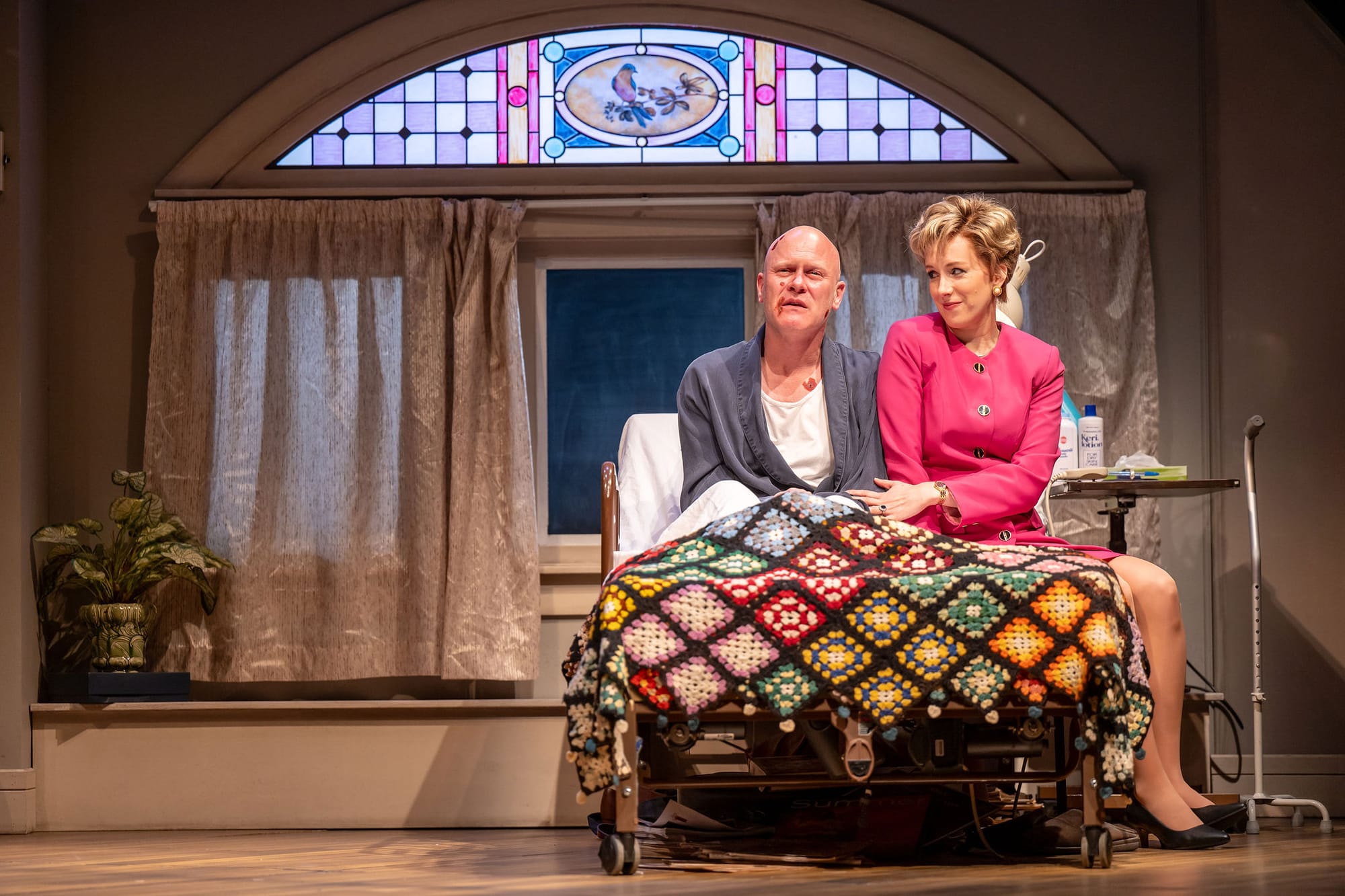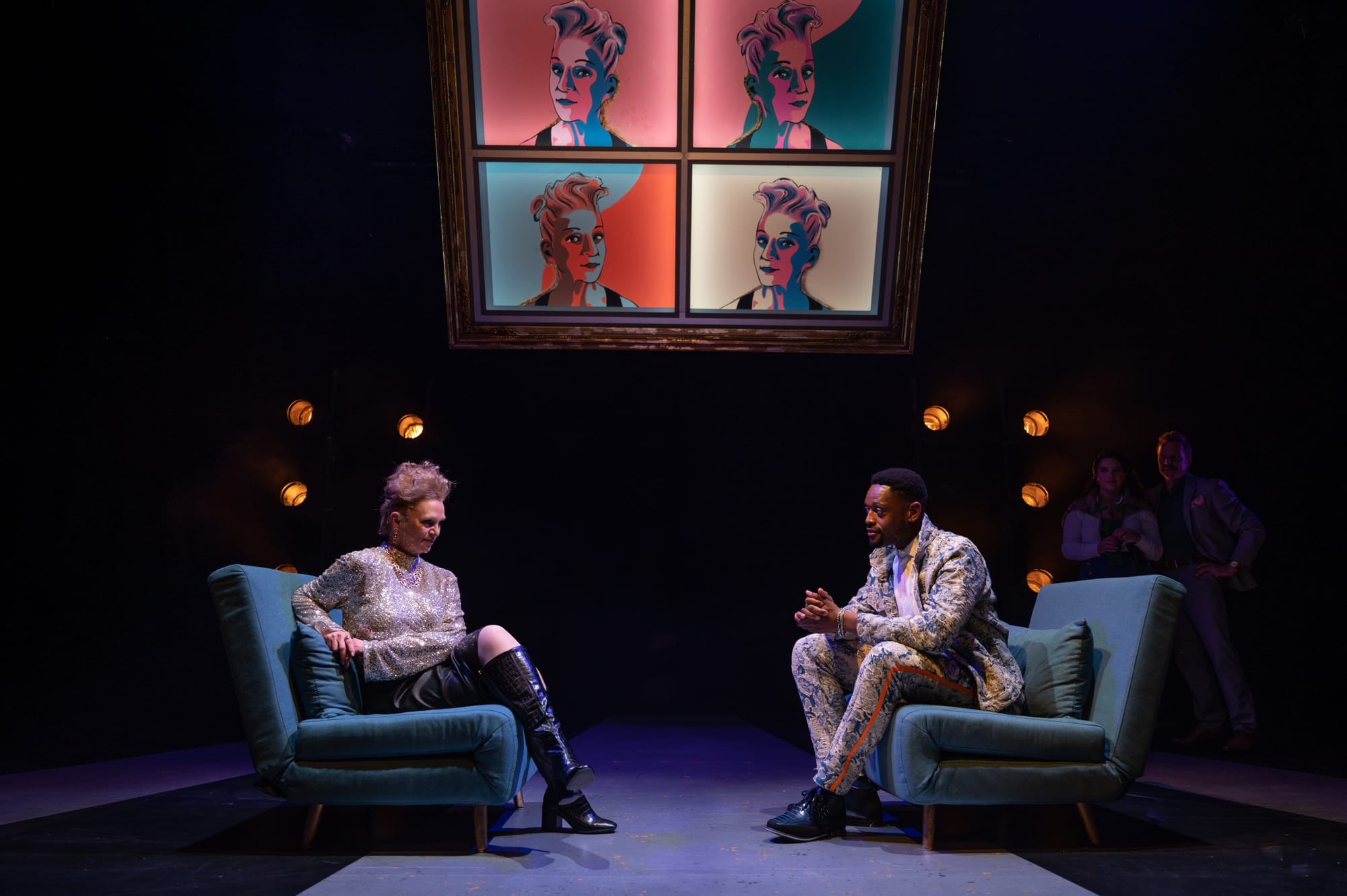Reviews: Casey and Diana and Rockabye
Nick Green's Stratford Festival hit transfers successfully to Soulpepper, while Australian Joanna Murray-Smith's music satire sounds some wrong notes

If you missed the brief, completely-sold-out run of Nick Green's Casey and Diana (Rating: ✭✭✭✭) last summer at the Stratford Festival, you've got another chance to catch it at Soulpepper. There's been one cast member change, and the set has been altered to fit into the Young Centre's Baillie Theatre (more on that below), but the heart of the piece, and its fine performances, have remained intact.
It's inspired by the much-publicized 1991 visit of Princess Diana to the Toronto AIDS hospice Casey House. The beloved icon's genuine compassion for the men living with the syndrome, and her ability to literally reach out and touch them – without gloves – made international headlines and did a lot to destigmatize AIDS for the general public.
The play focuses on Thomas (Sean Arbuckle), a middle-aged gay man who's the longest living resident at the hospice. He keeps up a lively, campy banter with nurse Vera (Sophia Walker) and volunteer Marjorie (Linda Kash), and is trying to establish a rapport with the young Andre (Davinder Malhi), his quiet new roommate.
Thomas wields much of his humour like a protective shield; underneath, he's still recovering from a painful incident involving his sister Pauline (Laura Condlln), who's been trying to track him down and find him.
When Vera announces the news about Diana's impending visit, the residents perk up. Obsessed with how they ought to address her, what they should talk about and what they will wear, they are determined to make the visit a success. Thomas, in particular, sees this as a way to cling on for another week.
There's lots to admire in Green's script. His background and training as a social worker ensures lots of details feel authentic, from Vera's professional detachment and firm, cool-headed interaction with visitors to Marjorie's cheerful, boundary-pushing behaviour with Andre.
Green's given both women such well-drawn lives and backstories that you understand why they're doing what they're doing. Thomas, a former waiter in the gay village, clicks into place with his snappy comebacks and endless cache of pop culture references, while Andre's situation gradually becomes clearer as the play progresses.
Most intriguing is how Green deals with Diana herself (Katherine Gauthier, new to the cast), who floats through the play like a gentle, healing spirit full of empathy.
As he did at Stratford, Andrew Kushnir directs the play with care and sensitivity, Debashis Sinha's sound design and Louise Guinand's lighting helping guide us through the emotional peaks and valleys of this stirring story.
Joshua Quinlan's costumes evoke the period beautifully, with Diana's outfits seeming just right. However, his set – which includes replicas of the stained glass windows from the iconic Victorian house – worked more effectively at Stratford's Studio Theatre. In the proscenium Baillie Theatre it feels a bit cramped, and the fluid transition of scenes from Thomas and Andre's room to the building's lobby, hallways and even the outdoors can seem awkward. It's odd that the Michael Young Theatre, which could have been configured to better suggest the original staging, wasn't used.
But the script and performances retain their power and seem to have deepened since the summer. We're given just enough about the relationship between Thomas and Pauline to suggest things about their pasts, including their parents. And at times Condlln pitches her performance at the same level as Arbuckle's, reminding us that they're siblings.
And, as with the original staging, the final climactic sequence is almost unbearable in its emotional intensity, with a touch of theatricality that Thomas, surely, would appreciate.
Less than a decade ago, Green won a Dora Award for The Body Politic, his sharp, fascinating look at founding the iconic Canadian gay publication. He could very well do the same with this play.
Casey and Diana continues at the Young Centre for the Performing Arts (50 Tank House) until February 11. See info here. See my interview with actor Sean Arbuckle here.

Meandering Rockabye
While Casey and Diana runs about two-and-a-half hours, it doesn't feel overly long. Rockabye (Rating: ✭✭), ARC's winter production, however, presents more of a challenge to sit through, even though it takes up only 10 or 15 more minutes than the other show.
Australian Joanna Murray-Smith's play is nominally about Sidney (Deborah Drakeford), an aging female rock singer in the UK who's at a turning point in her career. Written off as a has-been by most of the industry, she's just about to release a new album. Her sleazy manager, Alfie (Sergio Di Zio, in an always watchable performance), has been pitching a profile and review to hotshot journalist Tobias (Christopher Allen), who actually likes the direction of Sidney's new work.
But when Tobias runs into Layla (Shauna Thompson), a woman he once knew at Cambridge, at Sidney's home, he gradually discovers a big personal move that Sidney is about to take. And this changes what he thinks of his profile subject, and also affects him personally.
Murray-Smith's broad satire in the first half concerns the entertainment industry, with quips about the fresh new stars on the block and the enduring sexist double standard. Drakeford's Sidney – dazzlingly outfitted by costume designer Jackie Chau – is obsessed with Peruvian wheat germ, condescendingly talks to her staff and reminisces about her chart-topping glory days. (One of the most savage lines prophesies her future performing at a cabaret, with varicose veins and singing "The Rose.")
Things shift radically in the second act, however, as the themes turn more serious; and it's here that Murray-Smith seems out of her depth. What's worse, you begin to realize that subplots and characters from the first half – including Kyra Harper's Esme, one of Sidney's long-time staff workers, and Nabil Traboulsi's Jolyson, Sidney's current lover and a former musician himself – seem either extraneous or repetitive.
Several scenes end on lines of dialogue that seem to signal sort of importance, but fail to resonate. And there are entire chunks of dialogue – including an unfunny routine about the film Das Boot – that feel like filler.
There's not much that director Rob Kempson can do with scenes like that. But he does stage one crucial scene so far upstage that it's hard to hear and appreciate what's going on.
Adrian Shepherd-Gawinski's compositions are catchy, and his sound design establishes the shifts in mood nicely. Jareth Li's lighting design also allows for some exciting surprises. But if we got more of Sidney's music – either her earlier big hits or the new direction she's taking – it would have added more layers to the character and production.
Add to that the fact that we never understand Sidney's desire to change her life in such a big way, and you get a play that feels both overwritten and underwritten. A frustrating dilemma.
Rockabye continues at the Factory Theatre until February 11. See info here.
